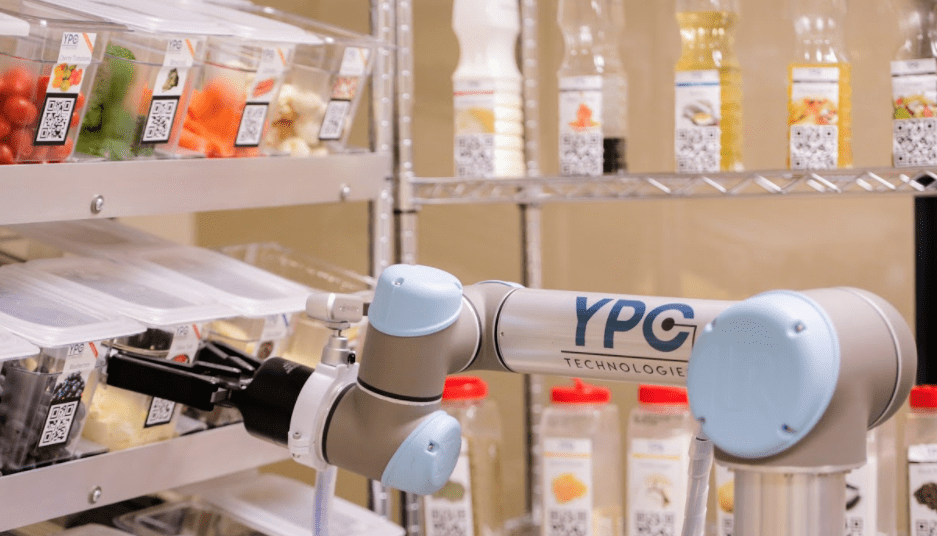Canada’s YPC Technologies is just one of a fistful of startups building robotic cooks and automated ovens for the foodservice industry.
It’s about to launch a pilot program with an undisclosed multinational; it’s also planning to set up a test center in a commercial kitchen this year, the Montreal Gazette reports.
Initially, at least, YPC is targeting a slightly different niche to the likes of Miso Robotics‘ Flippy — which has got gigs at grill stations in White Castle, Caliburger, and Los Angeles’ Dodger Stadium — burger-flipping bot Creator, and pizza-making mechanoids from Pazzi and SoftBank-backed Zume.
The Montreal-based company’s first offering, YPC1, is being aimed at canteens in factories and offices, serviced residences for the elderly, and other locations with limited or nonexistent kitchen facilities, rather than restaurants and fast-food joints.
YPC1 comes pre-programmed with about 10,000 recipes, ranging from asparagus soup and mushroom risotto to Thai green curry, Indian butter chicken, and dairy-free banana ice cream. A single human operator simply needs to key in the meal they need and how many plates are required, making it well suited for limited or restrictive kitchen spaces. YPC2 is already in the works and is expected to have a vastly expanded repertoire of 50,000 recipes.
In October 2020, YPC Technologies closed a C$1.8 million ($1.4 million) seed round co-led by Japan’s Hike Ventures and Canada’s Real Ventures. Toyota AI Ventures, Uphill Capital, and several angel investors also participated.
In a statement at the time, the startup said that instead of replacing human employees, its robotic system “collaborates” with people to “increase their output efficiency by taking care of highly repetitive cooking tasks.” Moreover, since its devices don’t need a vented range hood, they “can be operated in locations not suited for a standard commercial kitchen,” it added.
YPC said it plans to generate income by selling subscriptions to enterprise clients, starting with workplace and care facility canteens but moving on to hotels, restaurants, and cloud kitchens eventually. Subscriptions could cost in the range of C$3,000 to C$10,000 ($2,350-$7,850) per month, according to the Gazette.
Co-founder and CEO Gunnar Grass spoke to AFN about the company’s post-funding plans and how he believes its solution is differentiated from other kitchen robots on the market.
AFN: How will YPC be using the funding specifically?
Gunnar Grass: The primary milestone is to bring the next version of our unit to market during a pilot project with an industry-leading multinational. We expect to close our next round in the next 12 to 18 months.
What was the fundraising process like during Covid-19?
Investor conversations from March to May [2020] were tough; almost all funding activity seemed to shut down. Things picked up again in the summer.
How do you pitch your solution to investors and potential customers? How is it differentiated from other kitchen robotics solutions?
Our system is unique in that it can prepare a very large variety of different recipes – literally tens of thousands. This versatility enables us to access various market segments for which no robotic solution exists yet.
How are you acquiring customers? Has this process been made more difficult by Covid-19?
Through a combination of proactive reaching out, and people reaching out to us. Covid-19 halted conversations for several weeks but now interest is even higher than prior to the crisis, as ‘touchless’ cooking may help to reduce the spread of this and other diseases.
You make the point that one of the advantages of YPC’s solution is that it doesn’t require a vented range hood. What are the locations and contexts where such a solution is needed, and why?
One is residential high rises. A real estate company just reached out to us because they want to offer their tenants improved services, and their high rises do not have kitchen infrastructure. For similar reasons, office buildings are another one. Office buildings without kitchens may host companies which would like to start offering food to their employees.
Then there are cafeterias in senior living facilities or other sites that so far do not have a production kitchen, but can only reheat meals cooked elsewhere. Also, hotels without existing kitchens.
YPC sells its system on a subscription basis to enterprise clients. How does a subscription for robotics work, and why are customers willing to make recurring payments?
The subscription approach makes our system more affordable for our customers, as they can avoid the capital expenditure needed to buy robotics and appliances. The fees also cover maintenance.
What are the biggest challenges you’ve faced as a business, and how have you overcome them?
The biggest challenge has been building a company and raising funds during a global pandemic that affected many of our potential customers. We’ve overcome that with a mix of stamina and patience.
Got a news tip or a story idea? Email me at [email protected] or find me on Twitter at @jacknwellis





